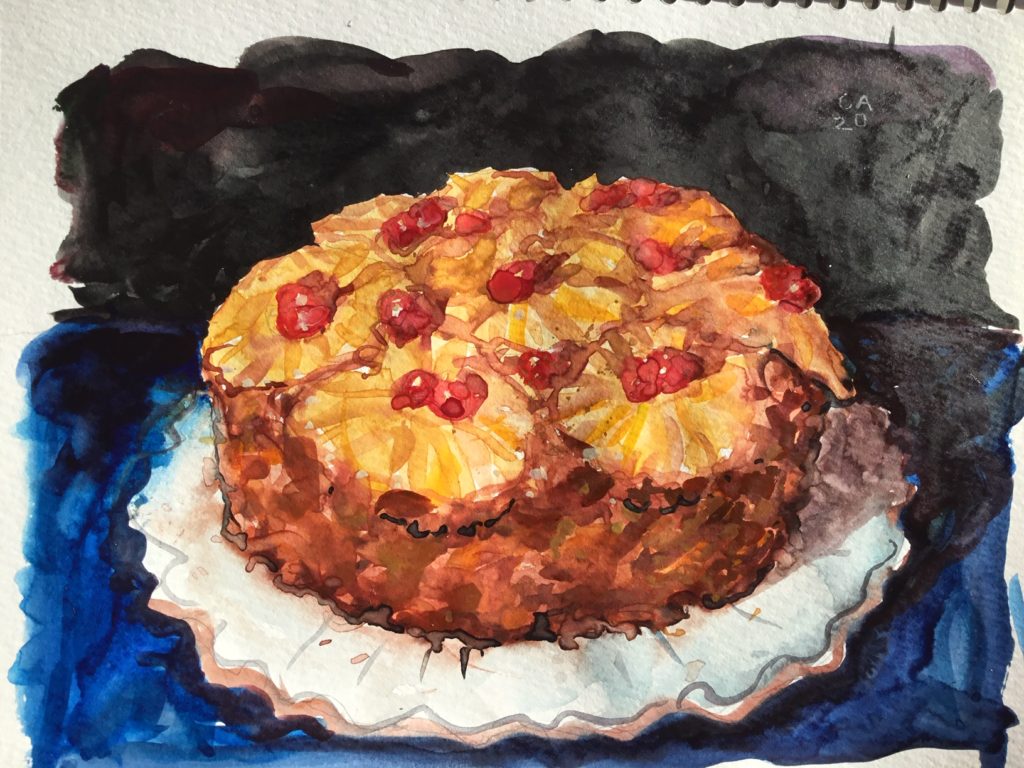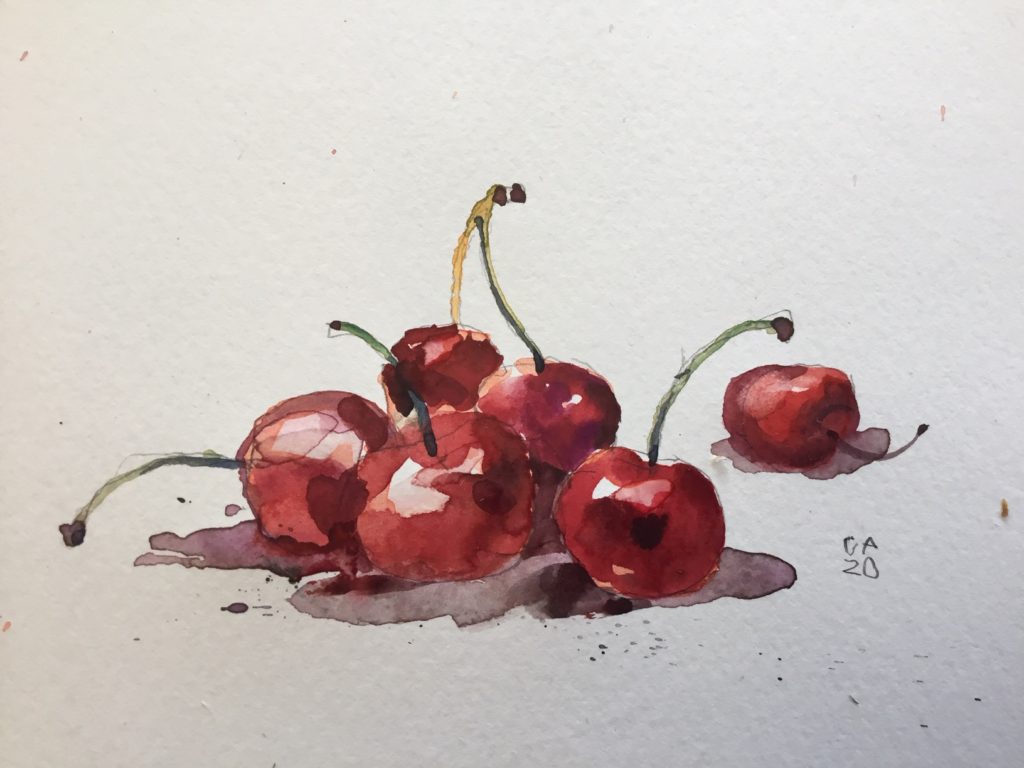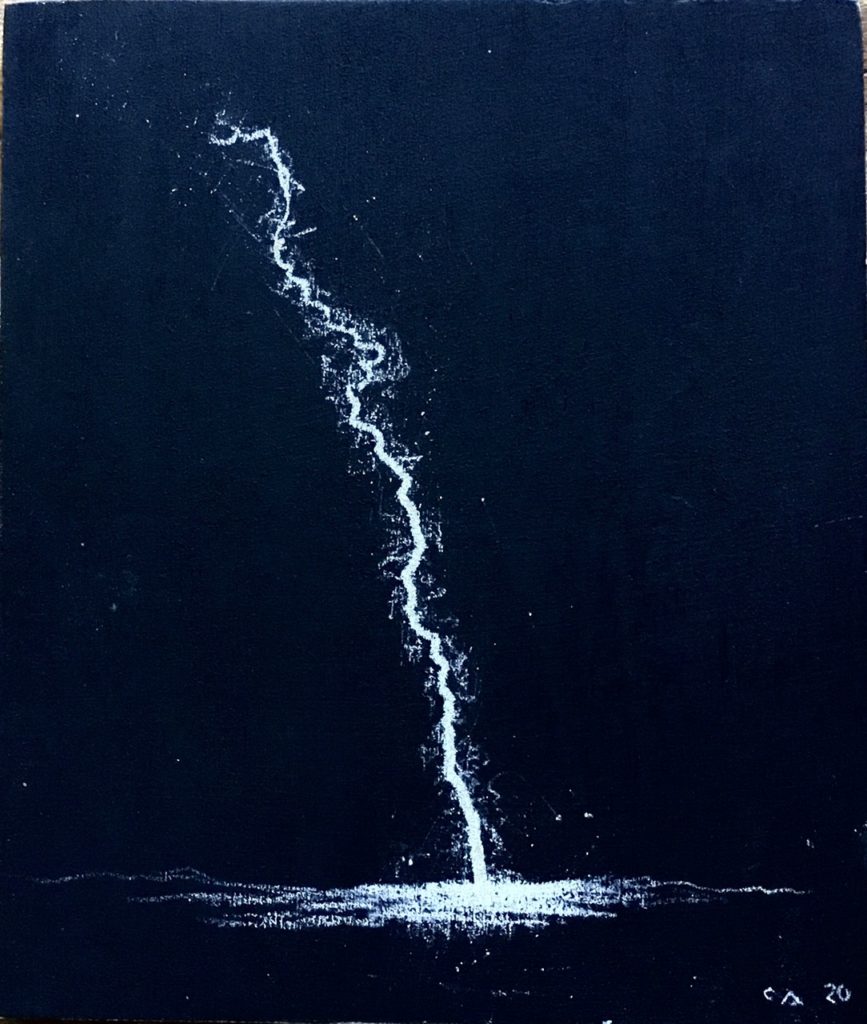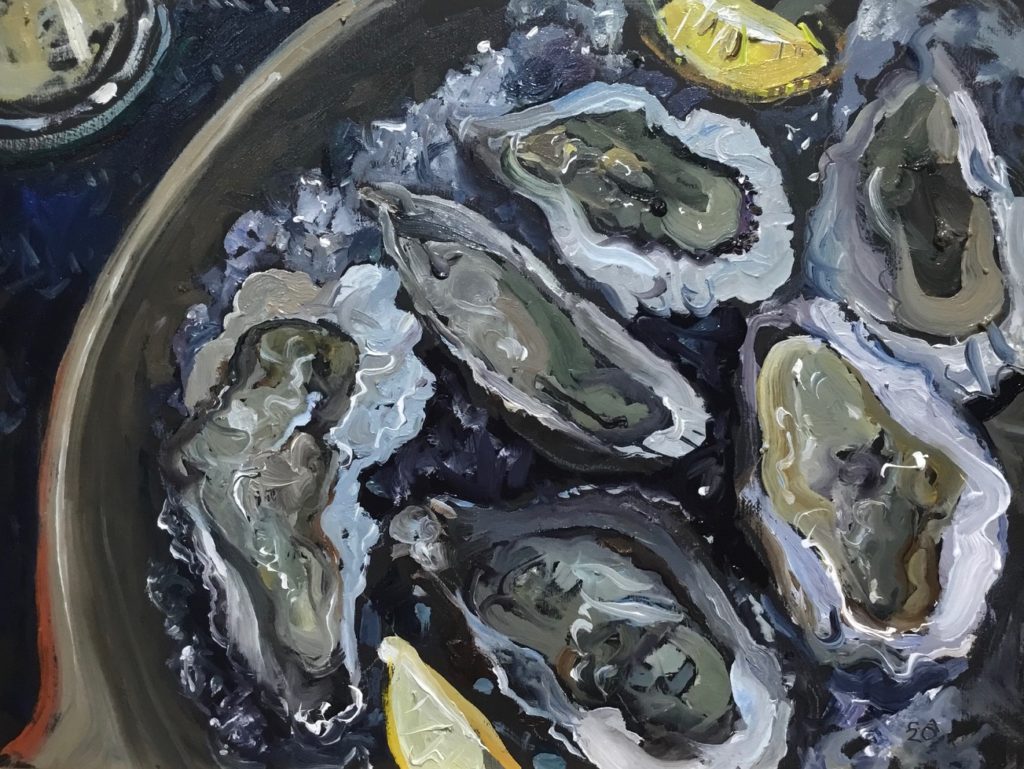I worked late into the night tweaking Roscoe’s video but, when I awoke a little after nine, I wasn’t ready to post it. I needed to clear my head. Pina was on a Zoom meeting in the living room, so I left the house, and hiked up through the cemetery and down the other side into town. Fortunately, there was an open table outside Sunflower Café. I tend not to be much of a breakfast person but I was seduced by the idea of a poached pear waffle. They sold me a pitcher of coffee so I wouldn’t have to keep going inside for refills. I also traded two dollar- bills for quarters to buy the Chronicle from a news box. Usually I blow through the Chron in ten minutes, but today I pretended that it was the Times and read every story in it.
Since the pandemic started the newspaper has become a thinned down version of its previous weak self. Many of the stories are Readers Digest versions of wire service reports. The strategy for the front section—a piddling ten pages—has been to enlarge the headlines and the font size of the stories to make up for the paucity of reporting but, like I said, I read them all, anything to take me away from my obsessive work with Roscoe.
A two-paragraph story on the South Carolina State Fair turning into a “drive-through experience” had me wondering why the esteemed editor chose it for inclusion. I read four paragraphs about the National Stadium in Warsaw being turned into a hospital, and nine slim graphs on the French schoolteacher that had been beheaded by an eighteen-year-old Chechen refugee for showing Charlie Hebdo caricatures of Mohammad as part of a discussion of free speech, but the story didn’t mention Charlie Hebdo or that the Chechen did the deed with a knife and fired a BB gun at the police before they killed him.
As I wolfed down my poached pear waffle, I thought about the implications of the beheading story: the clash of cultures—Islamic fundamentalists celebrating the killing against the traditional French concept of freedom. I considered the story’s parallel with right wing extremists and media outlets in our country, excusing the seventeen-year-old kid who murdered two peaceful protesters in Kenosha, Wisconsin. Now, I thought, the backlash against immigrants will intensify in France.
Four cups of coffee in, my mind spun off on a tangent about how the French balanced their virtues and brutality. They cherished liberty while mistreating Jews, North Africans, and immigrants of all stripes.
Then my caffeinated mind shot back to Gabrielle, my perfect French girlfriend who dumped me during my junior year of college for a Senegalese track star. Gabrielle corrected every word I tried to pronounce in her native language. She also shook her head like she believed I was hopeless. Once I remember bringing a small bouquet of flowers to her apartment. They were zinnias in a muted pink that seemed very French to me. Gabrielle said, “Oh, they’re vieux rose, or old pink to you.” The French phrase struck me as the perfect description of not only the color but the character of the flowers. I tried to pronounce vieux as Gabrielle did and she corrected my pronunciation three times. On my fourth try I got it, more or less, and she laughed: “You should see your mouth; you just turned your lips into a duck’s mouth.”
I must have been reliving that infamous moment, trying to pronounce vieux soundlessly, when Sally turned up on the sidewalk and startled me. “What the heck are you doing with your lips, dad?” She burst out laughing. “You trying to make your mouth look like Roscoe’s?”
There are times when the past and the present become perfectly synchronized.
I invited Sally to sit at my table and pushed my chair back to gain some extra distance. I felt bad that I hadn’t called her for more than a week. I got so caught up with Roscoe and just thought I’d let her carry on for herself awhile.
Sally sat and settled her elbows on the table. She looked good like she’d been getting her sleep and eating well. I worried that when she moved into her apartment she’d be drinking and doing drugs all night with her new boyfriend.
“No, really, what were you doing with your lips, dad?”
“Practicing my French.”
“You are so weird, dad.”
I wasn’t sure whether or not to celebrate the assessment.
“So, how’s Pina?”
“She’s good, back to a pretty full schedule at work.”
“I like Pina, but I don’t think she likes me.”
“That’s not true.”
Sally shrugged.
“Are you hungry, honey?”
She tilted her head sideways and smiled at me. “What’s the deal with you old people? You always use food to change the subject. Is that something they taught you in school?”
“Yes, cafeteria studies. It so happens that the poached pear waffles are pretty tasty.”
“I just had my cereal, dad. But I’ll pick up a latte here.”
I offered Sally money for the coffee and she declined, the first time she’s done that in modern memory.
A few moments later when she sat down with her latte she said, “Guess what, I got a job at Whole Foods. I know, working for the devil. Somebody said that if Jeff Bezos gave every one of his employees $100,000 he’d still have as much money as he had before the pandemic started. I don’t know if that’s just Amazon or if it includes all the subsidiaries like Whole Foods and the Washington Post.”
“Do you like the job?” I asked.
“Yeah, they’re good people to work with. I like being in Sonoma, aside from when there was the awful smoke. Sonoma’s like a fairy town; everybody’s so easy going. But that guy you saw me with—bad news. I cut him loose when he told me he voted for Trump and was going to do it again.”
I wanted to grab Sally’s hands, but talked myself out of it.
“Maybe I can finally get over being with bad boys.” Sally’s eyes grew cloudy and her lips quivered. “I never told you, but Alger used to beat on me. I mean, not really bad.”
“Oh, Sal.” I felt a mix of sorrow and rage and could hardly stay seated.
“You know, over the years I got a few black eyes is all, and he broke my arm once. I could usually talk him down. It starts to seem normal; that’s the scary part. He’d take the money you put in my account and sometimes there wasn’t much to eat.”
“Oh, no, honey.”
“He has a habit, that’s the thing and, you know, his dad beat him. He told me I was fat a lot, even though I’m not fat, but that’s what he told me, and I guess I started to believe it.”
I stood up. “I’m so sorry.” I so much wanted to take Sally in my arms, but I reminded myself of Pina and the virus. Damn the virus. “Have you thought about doing some therapy, dear?”
Sally didn’t answer, but her face kind of collapsed into the table and I could see a puddle of tears forming.
I felt overwhelmed with a sense of futility and, of course, said the predictable thing: “Sally, the poached pear waffles are really good.”
“Dad,” she said, a slight smile forming on her crumpled face.
Two hours after getting back home and sitting with my head in my hands, I posted Roscoe’s near perfect video, with the aid of a hashtag generator, which suggested: #vote2020, #votenow, #parrotspeaking, #parrotmagic, and #doitforroscoe. I had done my homework and already set up a Facebook page for Roscoe along with a YouTube channel, as well as Twitter, Instagram, and Tik Tok accounts.
At the start of the video Roscoe holds his head high as he says: “Greetings, my fellow Americans.” He chirps three times and turns his head to the side, before he deadpans: “They call me Roscoe.” His pause after that line is as deft as a stand-up comic’s. Now he looks directly at the camera and his parrot voice deepens, with an assist from listening to many hours of Alfred Hitchcock tapes: “Much as I would like to vote, they will not allow it.” Roscoe winks his left eye before holding his head high again and coming in for the kill, with four crisp sentences: “But you can vote. Do it for yourself. Do it for your country. Do it for Roscoe.”
Two hours after posting the video on each of the platforms, it went viral. It was Sally who let me know. She called just as I was preparing chicken cacciatore.
“Dad,” she shouted, “Roscoe is everywhere. He’s gone viral and #doitforroscoe is trending.”
I dropped my wooden spoon into the Le Creuset.
“If you have any more videos get them out there quickly. Roscoe could rock the vote!”
I was thinking that that sounded like a bit of hyperbole on Sally’s part, when she said, “You know, I’ve been reading the comments and most people don’t think Roscoe is real; they think he’s an amazing manipulation. Anyway, he’s more valuable that way.”
“You mean a fake talking parrot is worth more than the genuine thing?”
“Come on, dad, you know that. The real thing is a dime a dozen, but quality fake things are rare. Everybody wants to know who’s doing the Roscoe manipulation. You could end up famous, dad.”
“I don’t want end up famous.”
“It may be too late for that.”
Pina and I discussed the Roscoe phenomenon and I told her I’d had enough of it and didn’t want to talk Roscoe or the video until after dinner. Pina wasn’t keen on discussing last night’s final debate—I did manage to get in David Axlerod’s good line about Trump’s debate performance: “Republicans were relieved that he was eating with a knife and fork. But it was still the same meal.’’ And since Sally’s revelations were more than I had the heart to reveal at that moment, we were left with too much time to analyze the cacciatore. Pina thought I could have used more wine in it. I begged to differ. I got her to agree that the Kalamata olives I tossed into the stew came to play.
By the time we tuned in to the video on Twitter, it had 890k views, 109k hearts and Roscoe had gained 92K followers. After the third time through Pina said, “You’ve created an icon, Charlie. Roscoe can become a force for good in the world.”
“I think that’s a little much,” I said. “People don’t even think he’s real.”
“It doesn’t matter. Now that you’ve created the Roscoe brand, you can do whatever you want with it.”
So now Roscoe had become a brand?
“And, you know what,” Pina said, “the video makes me like Roscoe better.”
What’s not to like, I thought. Roscoe is the hardest working parrot in the world.
Later in the evening Pina and I walked into Roscoe’s room. I felt bad about waking him, but I decided to take Sally’s recommendation to strike while the iron is hot. I told Roscoe how popular his video is.
“Naturally,” he said, with a wink.
“You’re a rock star.”
We worked hard on the next video, in which I had the parrot take a more jaunty approach: “Greetings, citizens. Roscoe here. I tend to be a non-partisan parrot, but I’m now compelled to say, ‘Vote Biden!’ Do it for yourself. Do it for your country. Do it for Roscoe.”
In the morning when I post it, I will add a hashtag: #roscoerocksthevote.




